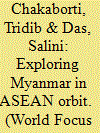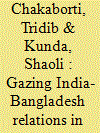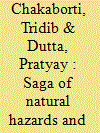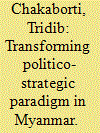|
|
|
Sort Order |
|
|
|
Items / Page
|
|
|
|
|
|
|
| Srl | Item |
| 1 |
ID:
131569


|
|
|
|
|
| Publication |
2014.
|
| Summary/Abstract |
In recent years, the changing power dynamics of the past military rulers to civilian way of functioning has raised number of questions in the discourse of international politics. This shift of power structure has evolved on account of a number of important factors; the autocratic rule of the military junta, the absence of democratic norms, violation of Human Rights, followed by under development on account of international sanctions, pressure from the Western world to follow democratic norms, the inclusion of Myanmar into ASEAN and the pressure of the latter on the former to establish democracy, remains the prime reason for the weak economic development. The shifting paradigm of military rulers to civilian government since 2011 followed by the entry of various actors like USA, India, Japan, and China shifted the entire gamut to a different direction. This article will highlight the role of ASEAN over the years with reference to Myanmar's new government and assess the implication in India.
|
|
|
|
|
|
|
|
|
|
|
|
|
|
|
|
| 2 |
ID:
142124


|
|
|
|
|
| Summary/Abstract |
The thumping victory of the 2014 Lok Sabha Election gave Modi a better space to initiate Act East Policy with Bangladesh. Within this short span of time, his gesture towards the Bangladesh government remains quite constructive in its entirety. One of the prime goals of current NDA government was to ‘Make in India’ where inviting foreign investment remains the core idea. To implement this, India needs better connectivity with its immediate neighbors, where Bangladesh, Myanmar and North-Eastern states are directly connected and Nepal and Bhutan are indirectly connected. This connectivity constitutes the major component of India’s current Act East Policy, where economic improvement of the North-Eastern region also remains a prime segment. It is too early to evaluate the current NDA government’s performance with the past government, because both initiated better ties with Bangladesh. However the current trend of Modi’s outlook towards Bangladesh is way ahead of its predecessor. This positive outlook of India was evident from the speech delivered by Prime Minister Narendra Modi, at Dhaka on 6 June, 2015, where he said: “We are not just neighbours. We are two nations bound by the threads of history, religion, culture, language and kinship - and, of course, passion for cricket….We will work together to harness the rich potential of our relationship. And, we will address our challenges in a spirit of friendship and from a position of mutual trust and confidence”.This is no doubt a major pragmatic shift of India’s Bangladesh policy in recent times under NDA government and it is hoped that it would perform much better than the past years and also for the come days.
|
|
|
|
|
|
|
|
|
|
|
|
|
|
|
|
| 3 |
ID:
146727


|
|
|
|
|
| Summary/Abstract |
India’s foreign policy discussion remains incongruous without the mention of India and Pakistan relation. Since independence, both India and Pakistan has been in logger heads with each other and the origin of their conflict is regarding the Kashmir issue. Prime Minister Atal Bihari Vajpayee during his tenure had tried through diplomatic ways and bilateral dialogue to resolve the various issues which hinder their bilateral ties. However, his repeated efforts could not fulfill his aim of developing friendly relations with its immediate neighbours. At present our present Prime Minister Narendra Modi is also trying to carry forward the legacy of Vajpayee with regard to India’s relation with Pakistan.
|
|
|
|
|
|
|
|
|
|
|
|
|
|
|
|
| 4 |
ID:
145379


|
|
|
|
|
| Summary/Abstract |
Today, most of the states have adopted a national disaster management policy. One of its important components is the use of information technology to improve and facilitate disaster management. Looking at the massive destruction caused to the lives and livelihoods by the recurring natural disasters in different parts of the world it has been increasingly realized that though complete prevention of natural disasters is beyond human capabilities, the adverse impact of any disaster on human lives and their livelihoods can be minimized by taking adequate early warning, preparedness and mitigation measures.
|
|
|
|
|
|
|
|
|
|
|
|
|
|
|
|
| 5 |
ID:
121929


|
|
|
|
|
| Publication |
2013.
|
| Summary/Abstract |
Myanmar is a country with significant politico-strategic imprint for the countries of South and Southeast Asia, and India is no exception to this phenomenon. Given its endowment of rich natural resources and a strong historical link with India, the changing politico-economic dynamics in the country, against the backdrop of the transformation from a military-led to a democratic administration, augurs well for the development of bilateral ties between India and Myanmar in the present global order. However, the casting shadow of China and the United States, both historically as well as in recent times, on the politico-economic and strategic profile of Myanmar definitely has a deep impact on Indian foreign policy formulation and practice, given the renewed importance accorded to Yangon within the domain of the 'Look East' policy. It is in this matrix that the present article tries to analyze the imprints of the shifting politico-strategic paradigm in Myanmar on India through the prism of the chosen parameters.
|
|
|
|
|
|
|
|
|
|
|
|
|
|
|
|
|
|
|
|
|